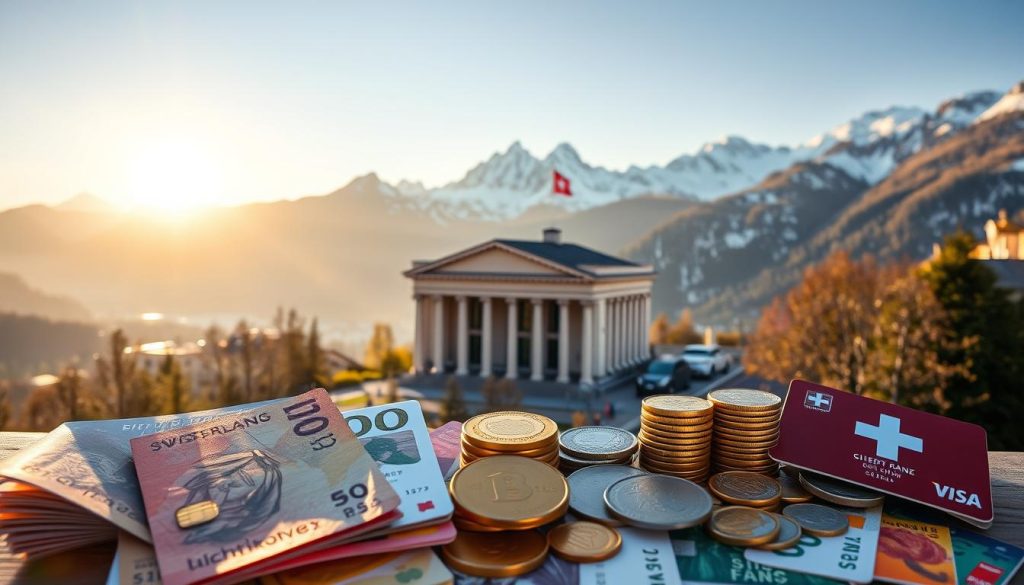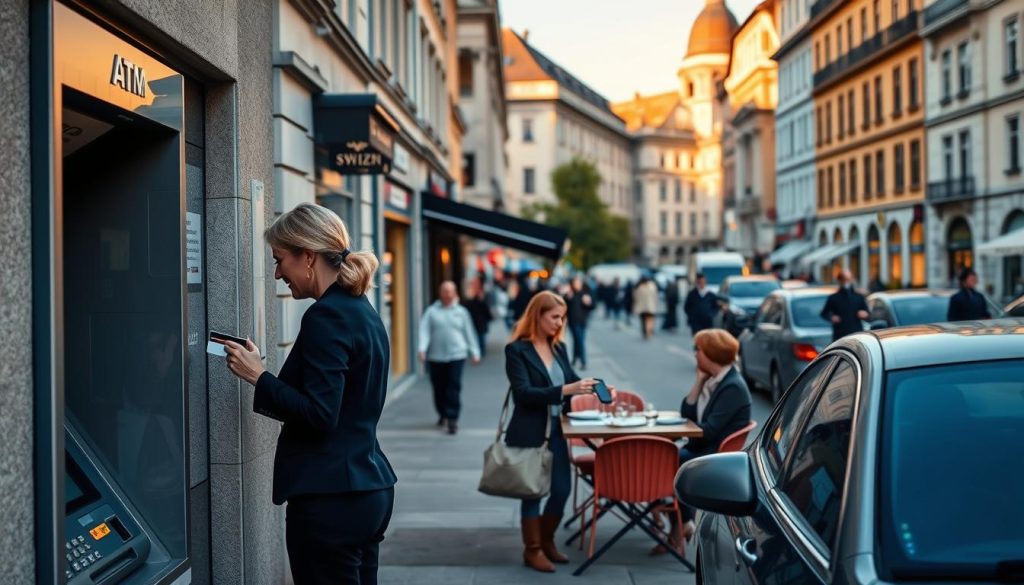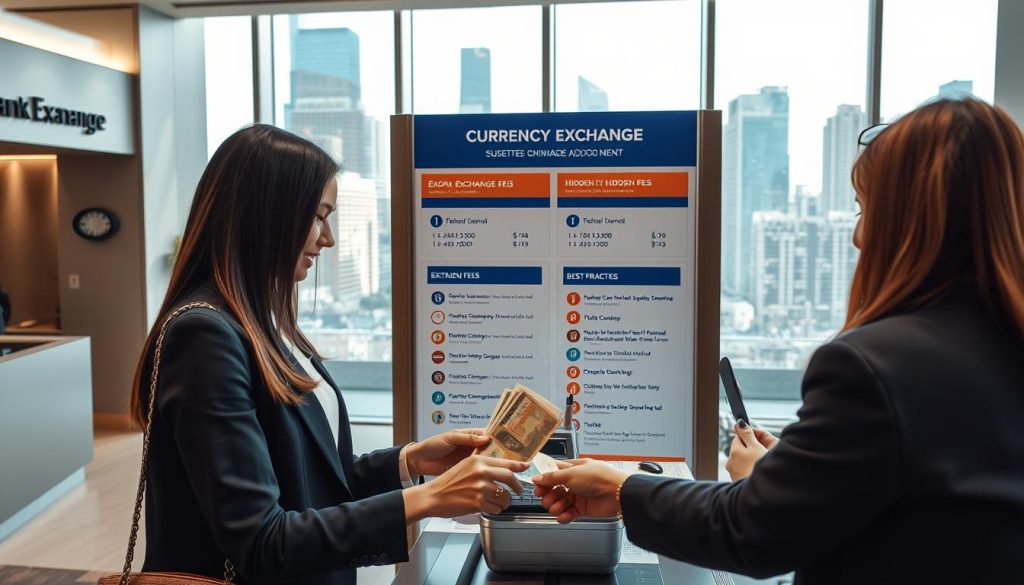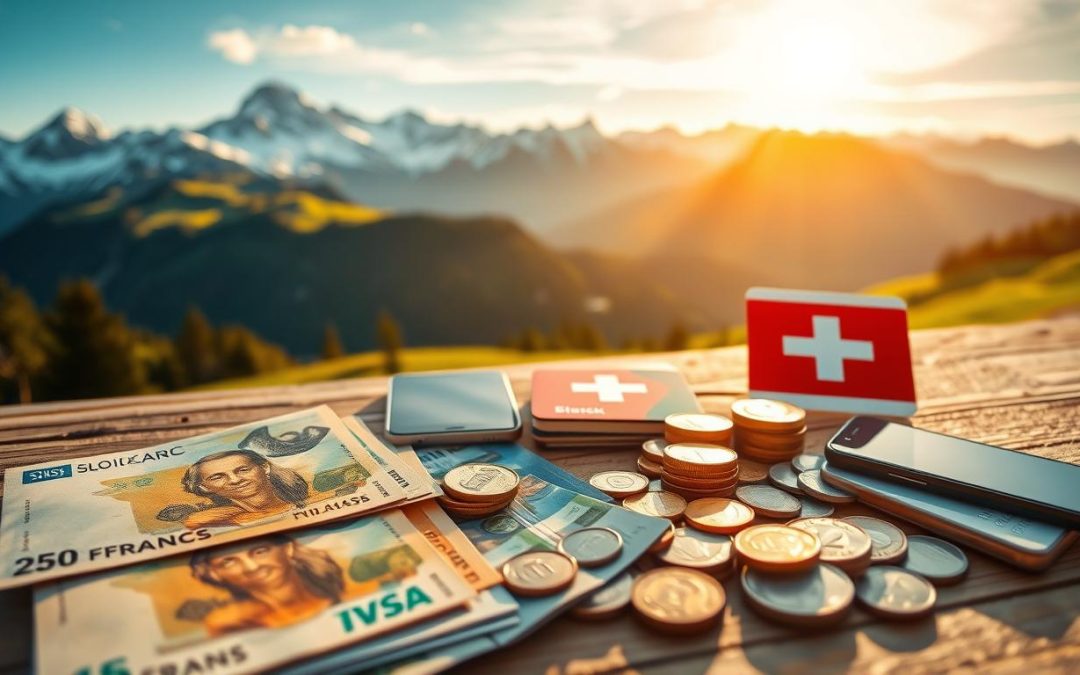Ever wondered how to make the most of your money while exploring a new country? Managing finances abroad can be tricky, but with the right knowledge, you can save time and avoid unnecessary fees. This guide is here to help you navigate the ins and outs of handling money in Switzerland.
The official currency is the Swiss franc (CHF), and it’s essential to understand how it works. From coins to banknotes, knowing the denominations can make transactions smoother. Whether you’re in bustling cities or quaint villages, you’ll find that both cards and cash are widely accepted, though each has its advantages.
One of the best tools for travelers is the Wise travel money card. It allows you to hold and spend in multiple currencies at the mid-market exchange rate, saving you from hidden fees. This guide will also cover tips for using ATMs, avoiding unfavorable exchange rates, and planning a hassle-free trip.
Key Takeaways
- The Swiss franc (CHF) is the official currency, divided into coins and banknotes.
- Cards are widely accepted in cities, but cash is preferred in rural areas.
- The Wise travel money card offers cost-effective currency exchange.
- Always choose to be charged in the local currency at ATMs to save money.
- Plan ahead to avoid high fees and ensure a smooth travel experience.
Overview of Switzerland’s Monetary Landscape
Understanding how money works in a new place can make your trip smoother. The official currency here is the Swiss franc (CHF), which is divided into 100 rappen. Banknotes come in denominations of 10, 20, 50, 100, 200, and 1000 CHF, while coins include 1, 2, and 5 francs, along with smaller rappen coins.
While the Swiss franc is the primary currency, many shops, hotels, and restaurants also accept euros. However, change is typically given in CHF, so it’s best to have local currency on hand. This is especially useful in rural areas where cash remains a preferred payment method.
Key Facts About the Swiss Franc
The CHF is known for its stability and is widely regarded as a safe-haven currency. It’s essential to familiarize yourself with the banknotes and coins to avoid confusion during transactions. ATMs are widely available, with over 7,000 across the country, making it easy to withdraw cash when needed.
Currency Acceptance and Comparison with the Euro
Although the euro is accepted in many places, it’s not universal. Using CHF ensures you won’t face issues with exchange rates or receiving change in a different currency. ATMs are a convenient way to get local currency, but be mindful of transaction fees, which can range from 5 to 10 CHF.
By understanding these details, you’ll feel more confident handling money during your visit. Whether you’re using cash or cards, knowing the basics of the Swiss franc and its acceptance will make your trip more enjoyable.
Switzerland: Ultimate Travelers Guide to Currencies & Payments
Managing your finances efficiently can make your trip stress-free and enjoyable. This guide aims to provide practical insights into handling money during your visit. One of the most important aspects is understanding the exchange rate. It affects everything from hotel bookings to dining out.
When booking a hotel, you’ll often see prices listed in both Swiss francs and euros. This makes it easy to compare costs and choose the best option. Always verify the exchange rate to ensure you’re getting a fair deal. Small differences in the rate can add up over time.

Here’s a quick comparison of average costs in Swiss francs and USD to help you plan:
| Expense | Cost in CHF | Cost in USD |
|---|---|---|
| Budget Hotel (per night) | 64 | 71 |
| Mid-Range Meal | 59 | 66 |
| Public Transportation (daily) | 10 | 11 |
Using secure payment methods is another key tip. Whether you’re paying for a hotel or a meal, always choose trusted options. This minimizes the risk of fraud and ensures your transactions are smooth.
By paying attention to the exchange rate and planning ahead, you can save money and avoid unnecessary stress. Take the time to understand how payments work, and your trip will be much more enjoyable.
Understanding the Swiss Franc and Currency Denominations
Navigating the Swiss franc’s denominations can make your financial transactions seamless and stress-free. The Swiss franc (CHF) is divided into banknotes and coins, each with distinct values. Knowing these details helps you handle money confidently, whether you’re shopping, dining, or exploring.
Banknotes and Coin Denominations
Swiss banknotes come in denominations of 10, 20, 50, 100, 200, and 1000 francs. These are widely used for larger payments, such as hotel bookings or train tickets. Coins, on the other hand, include 1, 2, and 5 francs, along with smaller units called rappen.
Rappen coins are available in 5, 10, 20, and 50 units. These are essential for smaller purchases like coffee or snacks. Familiarizing yourself with these denominations ensures you’re always prepared, whether you’re in a bustling city or a quiet village.
Insights into Rappen and Fractional Units
The Swiss franc is divided into 100 rappen, making it easy to handle fractional amounts. For example, if something costs 3.75 CHF, you’ll need a 2-franc coin, a 1-franc coin, and a 50-rappen coin. This system simplifies exchange and minimizes confusion during transactions.
Here’s how understanding rappen benefits you:
- It helps you give and receive accurate change.
- It ensures smooth transactions in both urban and rural areas.
- It reduces the risk of overpaying or underpaying for goods and services.
By mastering the breakdown of the Swiss franc, you’ll save time and avoid unnecessary fees. Whether you’re using cash or a debit card, this knowledge makes your trip more enjoyable and hassle-free.
Using Cards and Managing Payments in Switzerland
Knowing how to use cards and manage fees can save you time and money. In Switzerland, both credit and debit cards are widely accepted, but usage varies between urban and rural areas. Understanding these differences ensures you’re always prepared.

Credit and Debit Card Usage in Urban and Rural Areas
In cities, credit and debit cards are the go-to payment methods. Most restaurants, shops, and hotels accept them, making transactions quick and convenient. However, in rural areas, cash is still preferred, so it’s wise to carry some official currency.
Here’s a breakdown of card usage in Switzerland:
| Payment Method | Urban Areas | Rural Areas |
|---|---|---|
| Credit Cards | 84% | 60% |
| Debit Cards | 91% | 70% |
| Cash | 50% | 96% |
Tips for Avoiding Foreign Transaction Fees
To save time and money, always choose to be charged in the local official currency. Dynamic currency conversion, where you’re charged in your home currency, often comes with unfavorable rates.
“Always opt for the local currency to avoid hidden fees and poor exchange rates.”
Using a debit card like the Wise travel money card can help you skip extra fees. It allows you to hold and spend in multiple currencies at the mid-market rate. This is especially useful for frequent travelers.
Here are some additional tips:
- Check your card’s foreign transaction fees before traveling.
- Use ATMs affiliated with major banks to avoid high withdrawal fees.
- Notify your bank of your travel plans to prevent card blocks.
By following these steps, you can manage your payments confidently and enjoy a hassle-free trip.
ATM Accessibility and Best Practices
Accessing cash during your trip doesn’t have to be a hassle if you know where to look. ATMs are widely available in major cities, making it easy to withdraw local currency. However, in rural areas, they can be harder to find, so planning ahead is key.
Locating ATMs in Major Cities vs. Rural Areas
In urban centers, ATMs are abundant and often located near banks, shopping districts, and transportation hubs. You’ll rarely have to walk far to find one. In rural areas, however, ATMs are less common, and some villages may not have any at all. It’s a good idea to withdraw enough cash before heading to these regions.
Here’s what to expect:
- Major cities: ATMs are available 24/7, often with multilingual interfaces.
- Rural areas: Limited availability, so plan your cash needs in advance.
Choosing Local Currency Withdrawals
When using an ATM, always select the local currency option. This avoids dynamic currency conversion, which often comes with poor exchange rates and extra fees. Withdrawing Swiss francs directly ensures you get the best value for your money.
“Opting for local currency withdrawals saves you from hidden fees and unfavorable rates.”
Here are some additional tips:
- Use ATMs affiliated with major banks to avoid high withdrawal fees.
- Check your bank’s foreign transaction fees before your trip.
- Notify your bank of your travel plans to prevent card blocks.
Having cash on hand is especially useful in smaller shops and restaurants, where card payments may not be accepted. By following these best practices, you can ensure smooth access to funds and enjoy a hassle-free journey.
Currency Exchange Tips and Avoiding Hidden Fees
Getting the best exchange rate can make a big difference in how much money you save during your trip. Understanding how rates work and avoiding hidden fees ensures you get the most value for your currency Switzerland transactions.

Understanding the Mid-Market Exchange Rate
The mid-market exchange rate is the rate banks use when trading large amounts of currency Switzerland. It’s the fairest rate available, but most exchange providers add a markup. Using an online currency converter before your trip helps you know the true rate and avoid overpaying.
Here’s why the mid-market rate matters:
- It ensures transparency in your transactions.
- It helps you compare prices across different providers.
- It prevents you from falling for inflated rates.
Avoiding Airport and Hotel Exchange Markups
Exchange counters at airports and hotels often charge high fees and offer poor rates. These markups can cost you extra money without you realizing it. Instead, use online tools or withdraw local currency from ATMs for better rates.
“Always compare prices and rates before exchanging currency Switzerland to ensure you’re getting the best deal.”
Here are some steps to avoid hidden fees:
- Use trusted online services that offer mid-market rates.
- Avoid exchanging money at airports or hotels unless absolutely necessary.
- Check for additional fees like commissions or service charges.
By following these tips, you can save money and make your trip more enjoyable. Always prioritize transparency and fair rates when handling currency Switzerland exchanges.
Mobile Payments and Online Banking in Switzerland
Mobile payments and online banking are transforming how we manage finances abroad. With the rise of digital tools, handling transactions has become more secure and efficient. Whether you’re paying for a meal or withdrawing cash, these modern solutions make your trip smoother.
One standout service is the Wise Swiss Franc Travel Money Card. It integrates seamlessly with online banking, giving you full control over your funds. You can top up in your local currency and convert funds in real time using the Wise app. This eliminates hidden fees and ensures you get the best exchange rate.
Why Choose the Wise Travel Money Card?
The Wise card offers several advantages for travelers. First, it allows real-time currency conversion, which helps you avoid unfavorable rates. Second, it’s a cost-effective way to manage multiple currencies. Finally, it’s widely accepted, making it a reliable choice for both transactions and withdrawals.
“The Wise card simplifies currency management, ensuring you always get the best value for your money.”
Here’s how it benefits you:
- Secure and efficient transactions.
- Real-time currency conversion to avoid hidden fees.
- Convenient withdrawals at ATMs worldwide.
Mobile banking apps also play a key role in simplifying financial management. Many apps offer features like international money transfers and real-time balance updates. According to recent data, 73% of residents use online banking, making it a trusted service for both locals and visitors.
By embracing these digital tools, you can enjoy a hassle-free trip. Whether you’re using the Wise card or a mobile banking app, modern technology empowers you to handle money with confidence.
Planning Your Visit Around Currency and Payment Options
Planning your trip around the best times to handle finances can make your journey smoother and more cost-effective. Timing your visit to align with favorable exchange rates and efficient banking services ensures you get the most out of your money Switzerland experience.

Best Times to Experience Financial Services
Visiting during off-peak months, like April to October, offers several advantages. Fewer crowds mean quicker access to ATMs and banks. Milder weather also makes it easier to explore world-class financial hubs without the hassle of long lines or delays.
Winter months, while busy with sports enthusiasts, can still be a good time for financial transactions. Many banks extend their hours to accommodate tourists, and exchange rates often remain stable. However, it’s wise to plan ahead to avoid potential delays.
| Month | Peak Season | Off-Peak Season |
|---|---|---|
| April – October | Lower crowds, stable rates | Ideal for banking and ATMs |
| November – March | Busy with tourists | Extended bank hours, stable rates |
Urban centers like Zurich and Geneva are bustling year-round, but quieter months offer a more relaxed experience. In rural areas, planning your visit around local bank hours ensures you’re never caught without access to card Switzerland services or cash.
Here are some tips to maximize your financial experience:
- Visit during off-peak months for quicker service and better rates.
- Check bank hours in rural areas to avoid surprises.
- Use card Switzerland options in cities for convenience.
By aligning your trip with these insights, you can enjoy a seamless financial experience. Whether you’re exploring urban centers or rural villages, planning ahead ensures you make the most of your money Switzerland journey.
Additional Money-Saving Tips and Traveler Advice
Smart financial planning can turn your trip into a seamless adventure. By optimizing your spending and using the right tools, you can make the most of your budget. Here are some practical tips to help you save money and travel smarter.
Utilizing Secure and Cost-Effective Money Transfers
When sending money to your destination, choose secure and affordable options. Services like Wise offer online money transfers with minimal fees. They use the mid-market exchange rate, ensuring you get the best deal without hidden charges.
Here’s why Wise stands out:
- Real-time currency conversion at fair rates.
- Low fees compared to traditional banks.
- Convenient app for managing transfers on the go.
“Using Wise ensures you save money while transferring funds securely.”
Practical Tips for Budgeting and Spending
Planning your expenses ahead of time can help you avoid overspending. Start by booking accommodations and activities in advance to lock in the best deal. Use travel passes like the Swiss Travel Pass for unlimited public transport and discounts on attractions.
Here’s a quick comparison of daily budgets:
| Budget Type | Daily Cost (CHF) |
|---|---|
| Budget Travel | 100-150 |
| Mid-Range | 200-300 |
| Luxury | 400+ |
Using Travel Apps to Monitor Spending
Travel apps are invaluable for managing your budget. Apps like Wise and EasyFX allow you to track exchange rates, monitor spending, and convert currencies in real time. They also provide alerts for favorable rates, helping you save money.
Here are some additional tips:
- Cook meals instead of dining out to reduce food costs.
- Use reusable water bottles to save on beverages.
- Check for VAT refunds on purchases over CHF 300.
By following these tips, you can enjoy a stress-free trip while keeping your finances in check. Whether you’re exploring cities or rural areas, smart planning ensures you get the most out of your destination.
Conclusion
Handling money wisely during your trip can enhance your experience and save you from unnecessary stress. By understanding the local coin system and choosing the right payment methods, you can make every transaction smooth and cost-effective.
Using tools like the Wise travel money card ensures you get the best exchange rates and avoid hidden fees. It’s a smart code to follow for seamless financial management. Whether you’re withdrawing cash or paying with a card, being informed is key to avoiding extra costs.
Remember to always opt for local currency withdrawals and notify your bank of your travel plans. These small steps can make a big difference in your overall fay experience. Share these tips with friends planning similar trips and revisit this guide for future adventures.
The above is subject to change.
Check back often to TRAVEL.COM for the latest travel tips and deals.
Here are some Tours & Sightseeing suggestions that might pique your interests!
